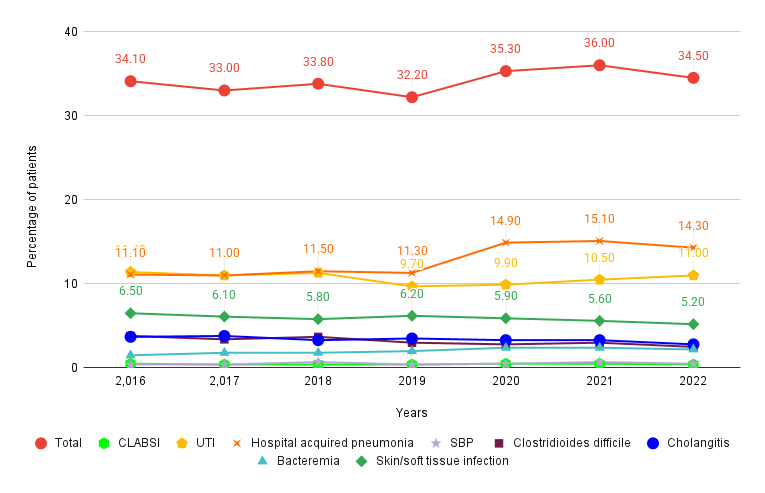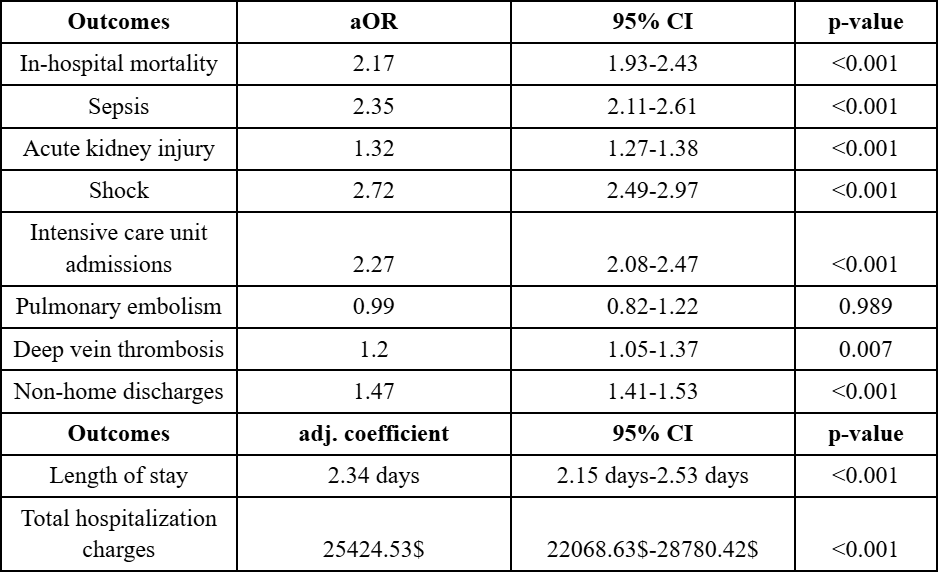Monday Poster Session
Category: Liver
P3785 - Trends, Burden and Impact of Infections in Liver Transplant Recipients: A Nationwide Analysis
Monday, October 27, 2025
10:30 AM - 4:00 PM PDT
Location: Exhibit Hall
- CS
Carol Singh, MBBS
Dayanand Medical College and Hospital
New Jersey, NJ
Presenting Author(s)
Carol Singh, MBBS1, Rahul Chikatimalla, MBBS2, Tanisha Sehgal, MBBS3, Sampada Bhasker, MBBS4, Mohammad Naseem, MBBS5, Vikash Kumar, MD6, Aalam Sohal, MD6, Mohanad Al-Qaisi, MD6
1Dayanand Medical College and Hospital, New Jersey, NJ; 2Kamineni Institute of Medical Sciences, Narketpalle, Telangana, India; 3Dayanand Medical College and Hospital, Ludhiana, Punjab, India; 4Punjab Institute of Medical Sciences, Jalandhar, Punjab, India; 5Maulana Azad Medical College, New Delhi, Delhi, India; 6Creighton University School of Medicine, Phoenix, AZ
Introduction: Liver transplant (LT) recipients face high risk of infections due to chronic immunosuppression, complex surgical procedures and pre-existing malnutrition, contributing substantially to morbidity, mortality and healthcare burden. This study aims to evaluate the trends, burden and impact of various infections on hospital outcomes in LT recipients.
Methods: The National Inpatient Sample (NIS) Database (2016-2022) was used to identify all adult LT recipients. Patients were categorized into two groups based on the presence or absence of infections. Data regarding demographics, liver disease etiology, liver-related decompensations, comorbidities and clinical outcomes were studied. Outcomes assessed were in-hospital mortality, sepsis, shock, acute kidney injury (AKI), intensive care unit (ICU) stay and thrombotic events. The impact of infections on these outcomes were evaluated using a multivariate logistic/linear regression analysis.
Results: Among the 247,955 LT recipients included in the analysis, 84,660 (34.1%) developed infections. The most common infections observed were hospital-acquired pneumonia (HAP) (12.8%), urinary tract infections (UTI) (10.7%) and skin/soft tissue infections (5.2%). The rates of various infections, stratified by year are presented in Figure 1. We also noted a higher incidence of in-hospital mortality (4.4% vs. 1.7%), sepsis (5.4% vs 2.2%), AKI (45.1% vs. 37.3%), shock (8.4% vs. 2.9%), ICU admissions (8.4% vs. 3.4%), deep vein thrombosis (DVT) (2.2% vs. 1.9%) and non-home discharges (47.1% vs. 35.9%) in patients with infections. After adjusting for confounding factors, patients with infections had higher odds of in-hospital mortality (aOR-2.17, 95% CI-1.93-2.43,p< 0.001), sepsis (aOR-2.35, 95% CI-2.11-2.61, p< 0.001), AKI (aOR-1.32, 95% CI-1.27-1.38, p< 0.001), shock (aOR-2.72, 95% CI-2.49-2.97, p< 0.001), ICU admissions (aOR-2.27, 95% CI-2.08-2.47, p< 0.001), DVT (aOR-1.20, 95% CI-1.05-1.37, p= 0.007), non-home discharges (aOR-1.47, 95% CI-1.41-1.53, p< 0.001), a longer length of stay (adj. coefficient- 2.34 days, 95% CI-2.15 days-2.53 days, p< 0.001) and higher total hospitalization charges (adj. coefficient- 25424.53$, 95% CI-22068.63$-28780.42$, p< 0.001) (Table 1)
Discussion: Our analysis reveals that infections in LT recipients are linked to worse clinical outcomes, emphasizing the need for vigilant prevention, early detection and targeted management to improve post-transplant care.

Figure: Figure 1. Rates of infections each year from 2016-2022.

Figure: Table 1. Results of multivariate logistic regression, assessing the impact of infections on outcomes and resource utilization.
Disclosures:
Carol Singh indicated no relevant financial relationships.
Rahul Chikatimalla indicated no relevant financial relationships.
Tanisha Sehgal indicated no relevant financial relationships.
Sampada Bhasker indicated no relevant financial relationships.
Mohammad Naseem indicated no relevant financial relationships.
Vikash Kumar indicated no relevant financial relationships.
Aalam Sohal indicated no relevant financial relationships.
Mohanad Al-Qaisi indicated no relevant financial relationships.
Carol Singh, MBBS1, Rahul Chikatimalla, MBBS2, Tanisha Sehgal, MBBS3, Sampada Bhasker, MBBS4, Mohammad Naseem, MBBS5, Vikash Kumar, MD6, Aalam Sohal, MD6, Mohanad Al-Qaisi, MD6. P3785 - Trends, Burden and Impact of Infections in Liver Transplant Recipients: A Nationwide Analysis, ACG 2025 Annual Scientific Meeting Abstracts. Phoenix, AZ: American College of Gastroenterology.
1Dayanand Medical College and Hospital, New Jersey, NJ; 2Kamineni Institute of Medical Sciences, Narketpalle, Telangana, India; 3Dayanand Medical College and Hospital, Ludhiana, Punjab, India; 4Punjab Institute of Medical Sciences, Jalandhar, Punjab, India; 5Maulana Azad Medical College, New Delhi, Delhi, India; 6Creighton University School of Medicine, Phoenix, AZ
Introduction: Liver transplant (LT) recipients face high risk of infections due to chronic immunosuppression, complex surgical procedures and pre-existing malnutrition, contributing substantially to morbidity, mortality and healthcare burden. This study aims to evaluate the trends, burden and impact of various infections on hospital outcomes in LT recipients.
Methods: The National Inpatient Sample (NIS) Database (2016-2022) was used to identify all adult LT recipients. Patients were categorized into two groups based on the presence or absence of infections. Data regarding demographics, liver disease etiology, liver-related decompensations, comorbidities and clinical outcomes were studied. Outcomes assessed were in-hospital mortality, sepsis, shock, acute kidney injury (AKI), intensive care unit (ICU) stay and thrombotic events. The impact of infections on these outcomes were evaluated using a multivariate logistic/linear regression analysis.
Results: Among the 247,955 LT recipients included in the analysis, 84,660 (34.1%) developed infections. The most common infections observed were hospital-acquired pneumonia (HAP) (12.8%), urinary tract infections (UTI) (10.7%) and skin/soft tissue infections (5.2%). The rates of various infections, stratified by year are presented in Figure 1. We also noted a higher incidence of in-hospital mortality (4.4% vs. 1.7%), sepsis (5.4% vs 2.2%), AKI (45.1% vs. 37.3%), shock (8.4% vs. 2.9%), ICU admissions (8.4% vs. 3.4%), deep vein thrombosis (DVT) (2.2% vs. 1.9%) and non-home discharges (47.1% vs. 35.9%) in patients with infections. After adjusting for confounding factors, patients with infections had higher odds of in-hospital mortality (aOR-2.17, 95% CI-1.93-2.43,p< 0.001), sepsis (aOR-2.35, 95% CI-2.11-2.61, p< 0.001), AKI (aOR-1.32, 95% CI-1.27-1.38, p< 0.001), shock (aOR-2.72, 95% CI-2.49-2.97, p< 0.001), ICU admissions (aOR-2.27, 95% CI-2.08-2.47, p< 0.001), DVT (aOR-1.20, 95% CI-1.05-1.37, p= 0.007), non-home discharges (aOR-1.47, 95% CI-1.41-1.53, p< 0.001), a longer length of stay (adj. coefficient- 2.34 days, 95% CI-2.15 days-2.53 days, p< 0.001) and higher total hospitalization charges (adj. coefficient- 25424.53$, 95% CI-22068.63$-28780.42$, p< 0.001) (Table 1)
Discussion: Our analysis reveals that infections in LT recipients are linked to worse clinical outcomes, emphasizing the need for vigilant prevention, early detection and targeted management to improve post-transplant care.

Figure: Figure 1. Rates of infections each year from 2016-2022.

Figure: Table 1. Results of multivariate logistic regression, assessing the impact of infections on outcomes and resource utilization.
Disclosures:
Carol Singh indicated no relevant financial relationships.
Rahul Chikatimalla indicated no relevant financial relationships.
Tanisha Sehgal indicated no relevant financial relationships.
Sampada Bhasker indicated no relevant financial relationships.
Mohammad Naseem indicated no relevant financial relationships.
Vikash Kumar indicated no relevant financial relationships.
Aalam Sohal indicated no relevant financial relationships.
Mohanad Al-Qaisi indicated no relevant financial relationships.
Carol Singh, MBBS1, Rahul Chikatimalla, MBBS2, Tanisha Sehgal, MBBS3, Sampada Bhasker, MBBS4, Mohammad Naseem, MBBS5, Vikash Kumar, MD6, Aalam Sohal, MD6, Mohanad Al-Qaisi, MD6. P3785 - Trends, Burden and Impact of Infections in Liver Transplant Recipients: A Nationwide Analysis, ACG 2025 Annual Scientific Meeting Abstracts. Phoenix, AZ: American College of Gastroenterology.
